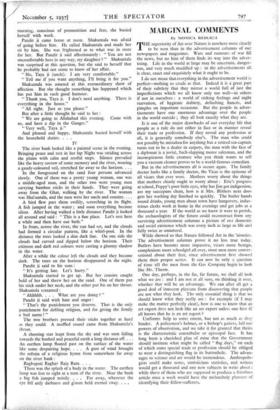MARGINAL COMMENTS
By MONICA REDLICH
THE superiority of Art over Nature is nowhere more clearly to be seen than in the advertisement columns of our newspapers and magazines. Wars and rumours of war fill the news, but no hint of them finds its way into the adver- tising. Life in the world at large may be uncertain, danger- ous, and very much muddled up : in the advertisements all is clear, exact and exquisitely what it ought to be.
I do not mean that everything in the advertisement world is perfect—nothing so crude as that. Indeed it is a great part of their subtlety that they mirror a world full of just the imperfections which we all know only too well—in others if not in ourselves : a world of sinking feelings and night starvation, of hygienic dubiety, defaulting fiancés, and pimples on important occasions. But the people in adver- tisements have one enormous advantage over the people in the world outside ; they all look exactly what they are.
It is one of the major drawbacks of our everyday life that people as a rule do not either in face or in manner reveal their trade or profession. If they reveal any profession at all, it is generally somebody else's. The man who could not possibly be mistaken for anything but a retired sea-captain turns out to be a dealer in carpets, the man with the face of a diplomat is a jovial, back-slapping motor salesman, and the inconspicuous little creature who you think wants to sell you a vacuum cleaner proves to be a world-famous comedian.
But in the advertisements all is secure again. The family doctor looks like a family doctor, the Vicar is the epitome of all vicars that ever were. Mothers worry about the things that mothers clearly ought to worry about : Eric's progress at school, Poppy's poor little eyes, why has Jim got indigestion, are my saucepans dean, how is it Mrs. Blithers next door gets her washing day finished so quickly. The butler hands round drinks, young men about town have hangovers, indus- trious clerks work at home in the evenings and get jobs at a thousand a year. If the world as we know it were to perish, the archaeologists of the future could reconstruct from any surviving advertisement columns a picture of our domestic and social existence which was every inch as large as life and fully twice as unnatural.
Wilde showed us that Nature followed Art in the 'nineties. The advertisement columns prove it no less true today. Butlers have become more impassive, vicars more benign, complexions more schoolgirl all over, stout men more conver- sational about their feet, since advertisement first showed them their proper métier. It can now be only a question of time till the men from the Gas Company begin to look like Mr. Therm.
One day, perhaps, in the far, far future, we shall all look what we are : and I am not at all sure, on thinking it over, whether that will be an advantage. We can after all get a good deal of innocent pleasure from discovering that people are not what they look. The only essential thing is that we should know what they really are : for example (if I may make the matter perfectly clear), how is one to know that an art expert does not look like an art expert unless one first of all knows that he is an art expert.?
Uniforms help to some extent, but not as much as they hinder. A policeman's helmet, or a bishop's gaiters, lull our powers of observation, and we take it for granted that theirs is the characteristic constabular or episcopal face. It has long been a cherished plan of mine that the Government should institute what might be called " flag days," on each of which some special trade or profession should be obliged to wear a distinguishing flag in its buttonhole. The advan- tages to science and art would be tremendous. Anthropolo- gists could make notes, statisticians statistics, and writers would get a thousand and one new subjects to write about : while those of them who are supposed to produce a frivolous article once a week would have the melancholy pleasure of identifying their fellow-sufferers.














































 Previous page
Previous page